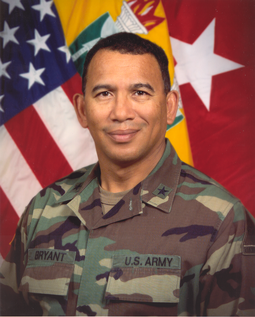United States Army general
Albert Bryant Jr. |
|---|
 |
| Nickname(s) | "Al" |
|---|
| Born | (1952-02-22) February 22, 1952 (age 72)
Pine Bluff, Arkansas, U.S. |
|---|
| Allegiance |  United States of America United States of America |
|---|
| Service / branch |  United States Army United States Army |
|---|
| Years of service | 1974–2008 |
|---|
| Rank |  Brigadier general Brigadier general |
|---|
| Commands | Commander, A Company, 2nd Battalion, 67th Armor, 2nd Armored Division
Commander, 4th Battalion, 67th Armor "Bandits," 1st Armored Division
Commander, 3rd Brigade Combat Team, 1st Armored Division
Director, Center for Army Tactics, Army Command and General Staff College |
|---|
| Battles / wars | Iraq War
Operation Iraqi Freedom
Operation Joint Endeavor |
|---|
| Awards | Defense Superior Service Medal
Legion of Merit (2 Oak Leaf Clusters)
Defense Meritorious Service Medal
Meritorious Service Medal (7 Oak Leaf Clusters)
Defense Distinguished Service Medal
Global War on Terrorism Service Medal
Global War on Terrorism Expeditionary Medal
National Defense Service Medal (2 Stars)
NATO Non-Article 5 Medal
German Ehrenkreuz der Bundeswehr (Gold)
Italian Commemorative Cross for Peace Operations
Bronze Star
Combat Action Badge
Parachutist Badge |
|---|
| Spouse(s) |
|
|---|
Albert Bryant Jr. (born February 22, 1952) is a retired United States Army brigadier general, best known for service as the Chief of Western Hemisphere Operations during and in the aftermath of the September 11 attacks and for his tenure as the Assistant Division Commander of the 4th Infantry Division at the time of the division's detection and capture of deposed Iraqi president Saddam Hussein. Bryant also served as the Deputy Commander of Fort Knox, Kentucky, and the United States Army's Armor School. As Chief of Staff of NATO's Kosovo Force (KFOR), Bryant was the highest ranking American general on the KFOR leadership team in the lead up to Kosovo independence.
